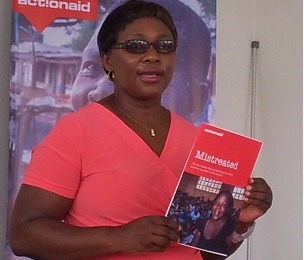![Khonje: pain could be less if there was equity in how multi-national corporations operating in the country pay taxes.]()
Malawians must forget the possibilities of bilateral donors bringing back their aid purses to Malawi, regardless of the fiscal management improvements put in place, ActionAid Malawi Country Director Martha Khonje has said, pointing out that saying the most paramount source of this funding is fairly taxing corporation so as to raise more revenue.
[caption id="attachment_104874" align="alignright" width="347"]
![Khonje: pain could be less if there was equity in how multi-national corporations operating in the country pay taxes.]()
Khonje: Malawi pain could be less if there was equity in how multi-national corporations operating in the country pay taxes.[/caption]
Khonje said on Wednesday in Lilongwe during the launch of the ‘tax treaties’ report that it is only fair that multinational corporations pay a fair share of the profits that they make in Malawi.
The report titled: ‘Mistreated: The Tax Treaties that are Depriving the World’s Poorest Countries of Vital Revenue’ states that tax treaties that aggressively lower tax contributions in lower-income countries “have no place in the 21st century”.
“Malawi is in a funding crisis following the withdrawal of direct budget support, and the governments need more money to provide quality public services such as health and education. However, negative impacts of a broken global and national tax system continues to perpetuating inequality and poverty, particularly to women and girls” said Khonje
She further said problem of corporate tax avoidance has been high on the political agenda in Malawi, at the African Union and at global level and it is the major challenge for developing and least developed countries, which rely more heavily on tax revenues.
Therefore, she recommended that to address the matter changes are required such as updating the global and national tax rules which allow companies to get away with paying little or no tax.
“Our recommendation to the government is that they should review all existing tax treaties not only with the UK but all other governments that Malawi has tax treaties with. Those [tax treaties] that are not working to our advantage should be renegotiated,” said Khonje.
She added: “The withdrawal of direct budgetary support by our development partners has left a huge funding gap in the government funding envelope, so we need to generate more revenue and fair tax from multinational corporations is the way to go.”
Minister of Finance Goodall Gondwe in his budget speech, of the 2015/2016 fiscal year agrees that it is was unlikely that the country’s bilateral donors will ever resume budgetary assistance following revelations of massive looting of public funds by greedy civil servants and businesses in what is known as the cashgate.
[caption id="attachment_104875" align="alignright" width="304"]
![Khonje with ‘tax treaties’ report]()
Khonje with ‘tax treaties’ report[/caption]
However, in same budget speech, he reiterated that it is crucial for Malawi to start restricting its fiscal framework without expecting the budgetary support that the country has been accustomed to receiving from development partners since its independence.
Governance Officer for ActionAid Chisomo Manthalu during presentation of the study revealed that the IMF estimates shows that developing countries currently lose US$ 200 billion every year to tax avoidance.
“I would like to emphasize this very strongly. Tax treaties between countries play a facilitating role in many of tax avoidance schemes used by multinational corporations to reduce their tax liability”, he said.
He also highlight that, for instance, in 2015 a study on how Malawi lost US$ 43 million in revenue over a six years , from a single company- the Australian mining Paladin company through a combination of harmful tax incentives from the Malawi government, not only that, but also tax planning using tax treaty shopping.
Government need to urgently consider the treaties which restrict the taxing rights of Malawi and multinationals pay their fair share of tax, and subject the treaties to far greater public scrutiny. Thus, it is so as to reform and curb base erosion and profit shifting and improving corporate transparency and also Taxation Act should be reviewed to improve their effectiveness and align them to best regional and international practices.

 Khonje: Malawi pain could be less if there was equity in how multi-national corporations operating in the country pay taxes.[/caption]
Khonje said on Wednesday in Lilongwe during the launch of the ‘tax treaties’ report that it is only fair that multinational corporations pay a fair share of the profits that they make in Malawi.
The report titled: ‘Mistreated: The Tax Treaties that are Depriving the World’s Poorest Countries of Vital Revenue’ states that tax treaties that aggressively lower tax contributions in lower-income countries “have no place in the 21st century”.
“Malawi is in a funding crisis following the withdrawal of direct budget support, and the governments need more money to provide quality public services such as health and education. However, negative impacts of a broken global and national tax system continues to perpetuating inequality and poverty, particularly to women and girls” said Khonje
She further said problem of corporate tax avoidance has been high on the political agenda in Malawi, at the African Union and at global level and it is the major challenge for developing and least developed countries, which rely more heavily on tax revenues.
Therefore, she recommended that to address the matter changes are required such as updating the global and national tax rules which allow companies to get away with paying little or no tax.
“Our recommendation to the government is that they should review all existing tax treaties not only with the UK but all other governments that Malawi has tax treaties with. Those [tax treaties] that are not working to our advantage should be renegotiated,” said Khonje.
She added: “The withdrawal of direct budgetary support by our development partners has left a huge funding gap in the government funding envelope, so we need to generate more revenue and fair tax from multinational corporations is the way to go.”
Minister of Finance Goodall Gondwe in his budget speech, of the 2015/2016 fiscal year agrees that it is was unlikely that the country’s bilateral donors will ever resume budgetary assistance following revelations of massive looting of public funds by greedy civil servants and businesses in what is known as the cashgate.
[caption id="attachment_104875" align="alignright" width="304"]
Khonje: Malawi pain could be less if there was equity in how multi-national corporations operating in the country pay taxes.[/caption]
Khonje said on Wednesday in Lilongwe during the launch of the ‘tax treaties’ report that it is only fair that multinational corporations pay a fair share of the profits that they make in Malawi.
The report titled: ‘Mistreated: The Tax Treaties that are Depriving the World’s Poorest Countries of Vital Revenue’ states that tax treaties that aggressively lower tax contributions in lower-income countries “have no place in the 21st century”.
“Malawi is in a funding crisis following the withdrawal of direct budget support, and the governments need more money to provide quality public services such as health and education. However, negative impacts of a broken global and national tax system continues to perpetuating inequality and poverty, particularly to women and girls” said Khonje
She further said problem of corporate tax avoidance has been high on the political agenda in Malawi, at the African Union and at global level and it is the major challenge for developing and least developed countries, which rely more heavily on tax revenues.
Therefore, she recommended that to address the matter changes are required such as updating the global and national tax rules which allow companies to get away with paying little or no tax.
“Our recommendation to the government is that they should review all existing tax treaties not only with the UK but all other governments that Malawi has tax treaties with. Those [tax treaties] that are not working to our advantage should be renegotiated,” said Khonje.
She added: “The withdrawal of direct budgetary support by our development partners has left a huge funding gap in the government funding envelope, so we need to generate more revenue and fair tax from multinational corporations is the way to go.”
Minister of Finance Goodall Gondwe in his budget speech, of the 2015/2016 fiscal year agrees that it is was unlikely that the country’s bilateral donors will ever resume budgetary assistance following revelations of massive looting of public funds by greedy civil servants and businesses in what is known as the cashgate.
[caption id="attachment_104875" align="alignright" width="304"] Khonje with ‘tax treaties’ report[/caption]
However, in same budget speech, he reiterated that it is crucial for Malawi to start restricting its fiscal framework without expecting the budgetary support that the country has been accustomed to receiving from development partners since its independence.
Governance Officer for ActionAid Chisomo Manthalu during presentation of the study revealed that the IMF estimates shows that developing countries currently lose US$ 200 billion every year to tax avoidance.
“I would like to emphasize this very strongly. Tax treaties between countries play a facilitating role in many of tax avoidance schemes used by multinational corporations to reduce their tax liability”, he said.
He also highlight that, for instance, in 2015 a study on how Malawi lost US$ 43 million in revenue over a six years , from a single company- the Australian mining Paladin company through a combination of harmful tax incentives from the Malawi government, not only that, but also tax planning using tax treaty shopping.
Government need to urgently consider the treaties which restrict the taxing rights of Malawi and multinationals pay their fair share of tax, and subject the treaties to far greater public scrutiny. Thus, it is so as to reform and curb base erosion and profit shifting and improving corporate transparency and also Taxation Act should be reviewed to improve their effectiveness and align them to best regional and international practices.
Khonje with ‘tax treaties’ report[/caption]
However, in same budget speech, he reiterated that it is crucial for Malawi to start restricting its fiscal framework without expecting the budgetary support that the country has been accustomed to receiving from development partners since its independence.
Governance Officer for ActionAid Chisomo Manthalu during presentation of the study revealed that the IMF estimates shows that developing countries currently lose US$ 200 billion every year to tax avoidance.
“I would like to emphasize this very strongly. Tax treaties between countries play a facilitating role in many of tax avoidance schemes used by multinational corporations to reduce their tax liability”, he said.
He also highlight that, for instance, in 2015 a study on how Malawi lost US$ 43 million in revenue over a six years , from a single company- the Australian mining Paladin company through a combination of harmful tax incentives from the Malawi government, not only that, but also tax planning using tax treaty shopping.
Government need to urgently consider the treaties which restrict the taxing rights of Malawi and multinationals pay their fair share of tax, and subject the treaties to far greater public scrutiny. Thus, it is so as to reform and curb base erosion and profit shifting and improving corporate transparency and also Taxation Act should be reviewed to improve their effectiveness and align them to best regional and international practices.